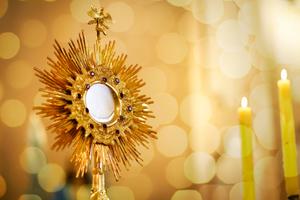Professor at Thomas Aquinas Becomes Its President
The new president at Thomas Aquinas College in California is one of the school’s longtime professors.
Michael McLean was happy in the various administrative roles he has been ap--pointed to during his 31 years at Thomas Aquinas College.
So when his friend and former college classmate Thomas Dillon, the previous president, died in a car accident in Ireland in April 2009, he did not think he would end up being tapped to become the college’s next leader.
But God had other plans.
“I entered this position with the trust and confidence that there has been something providential in it and God’s hand is in the college and in the way of how things are,” said McLean, the college’s dean. The school, located in the hills of Santa Paula, Calif., is known for its Great Books program, which involves students reading and discussing the classics rather than through textbooks or lectures.
“He represents everything that is right with the school,” said R. James Wensley, chairman of the college’s board of governors.
McLean, 62, will become the school’s fourth president in January, succeeding the interim president, Peter DeLuca. Dillon had led the college for 18 years before his death.
McLean’s goals? Be “fully committed” to the educational mission of the college, continue to attract faculty committed to the college’s mission and strong in their Catholic faith, attract students and maintain the college’s strong financial position.
In tapping a successor, the school looked within its walls. Its bylaws state that its president must come from within the ranks of its permanently appointed Catholic faculty members.
The selection process was simple: A committee was formed to interview all faculty members who have been at the school for more than five years. Those names were submitted to the entire faculty for a vote. The two top vote-getters were then sent to a subcommittee appointed by the college’s board of governors, who interviewed the two candidates. Their recommendation was sent to the full board, which made the final decision. The announcement of McLean’s appointment came on Oct. 27.
“You can see it’s not the kind of position people campaign or lobby for,” said McLean, who has a doctorate in philosophy from the University of Notre Dame. “It’s more of an effort to try to make the process as providential as possible and to ascertain what the will of the faculty is.”
‘Devotion to the Church’
McLean has had a variety of experiences at the college. He has been the assistant dean for student affairs, vice president for development and, since 2003, the dean of the college and a member of its board of governors.
Those experiences will serve him well in his new job, said Patrick Reilly, president of the Cardinal Newman Society, an organization dedicated to strengthening and renewing Catholic identity at Catholic colleges and universities.
“Not every faculty member is going to be an effective college leader, but Dr. McLean has taught, administered and raised funds,” Reilly said. “The key to Thomas Aquinas College is its curriculum and teaching, so identifying a president among its faculty is a wonderful means of preserving one of America’s most exciting institutions.”
McLean admitted his heart is in the classroom. But he plans to cut his teaching load in half when he assumes his new position.
“That will be a sacrifice because I love the students, and I love the work in the classroom,” he said.
A former student said McLean’s love of teaching really shows.
“He was the best teacher I had,” said Joseph Susanka, a 1999 graduate of the college. “He was very good at leading the conversation, making sure everyone stayed involved and making sure we got to where we needed to go. He brings that collaborative sense with him as a teacher, and I suspect that’s a large part of the reason why he will make a fine president.”
Paul O’Reilly, a faculty member and former student, has known McLean for about 28 years. He said McLean is well prepared to be president. He described him as friendly, approachable and devoted and attentive to students.
But another of McLean’s qualities also makes him stand out.
“His devotion to the Church prepares him wonderfully,” O’Reilly said. “We’re a Catholic college, first and foremost. The president must not only lead a Catholic college, but lead from within, knowing and appreciating the truth of the Catholic faith.”
McLean said he realizes the Catholicity of the college must be maintained, which is why he appreciated the selection process he went through.
“We’re fully committed to the teaching authority of the Catholic Church,” he said. “It’s our belief that the leadership of the institution should come from those who have the best understanding of the academic program and whose commitment to the teaching authority of the Church and whose commitment to the educational program here is without question. It’s important that the president be chosen from among the faculty.
“Catholic schools in recent times have in some measure drifted from their missions and have weakened their commitment to their Catholic character, and that happens because the leadership of the institution loses focus and loses their sense of the importance of that mission. We don’t want that to happen here.”
Carlos Briceño writes from Naperville, Illinois.
- Keywords:
- December 20, 2009-January 2, 2010













